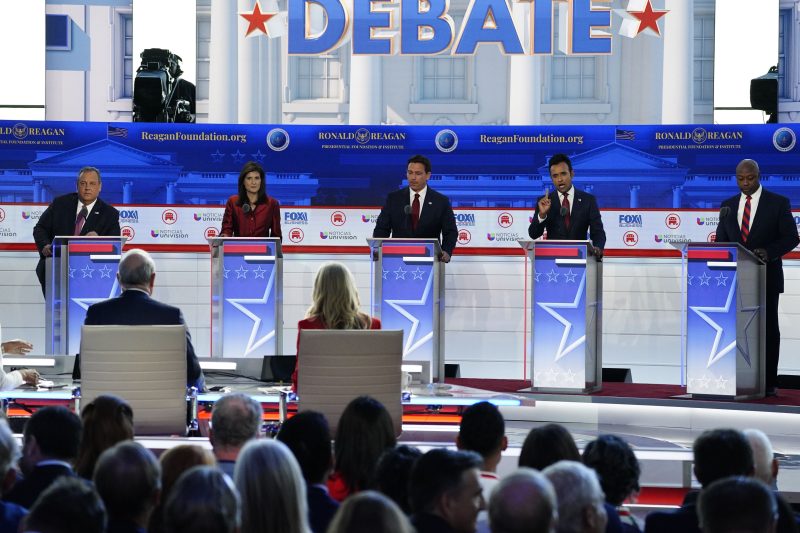The increasingly stark divide within the Republican Party on Ukraine was apparent onstage Wednesday at the second GOP presidential primary debate, as candidates sparred over whether to continue supporting the Eastern European country’s efforts to defend itself against an ongoing Russian invasion.
Florida Gov. Ron DeSantis, who earlier this year was widely criticized for dismissing Russia’s invasion of Ukraine as a “territorial dispute,” vowed Wednesday night that he would end the war, though he did not specify how he would do so.
2024 presidential election
End of carousel
“It’s in our interest to end this war and that’s what I will do as president,” DeSantis said. “We are not going to have a blank check. We will not have U.S. troops and we’re gonna make the Europeans do what they need to do.”
DeSantis was immediately criticized by former U.N. ambassador Nikki Haley — who told him the war has “never been a territorial dispute” — and by Sen. Tim Scott (S.C.), who laid out a case for continuing to support Ukraine.
“Ninety percent of the resources that we send over to Ukraine is guaranteed as a loan,” Scott said. “Our national vital interest is in degrading the Russian military. By degrading the Russian military, we actually keep our homeland safer … An attack on NATO territory would bring us and our troops in [to the war]. By degrading the Russian military, we reduce, if not eliminate, an attack on NATO territory.”
The questions about Ukraine also prompted some of the most chaotic exchanges of the night. Entrepreneur Vivek Ramaswamy, who had been trying to interrupt Scott, jumped in after the South Carolina senator finished to say that they needed to “level with the American people” about the war in Ukraine.
“Just because [Russian President Vladimir] Putin is … an evil dictator does not mean that Ukraine is good,” he said.
Haley interjected: “A win for Russia is a win for China. A win for Russia is a win for China.”
Ramaswamy cut her off and resumed: “China is the real enemy and we’re driving Russia further into China’s arms,” he said, calling for a “reasonable peace plan” to end the war.
Former vice president Mike Pence piped up and shouted, “Vivek, if you let Putin have Ukraine, that’s a green light to China [to] take Taiwan! Peace comes through strength!”
After much crosstalk, the moderators turned to former New Jersey governor Chris Christie to ask if the United States has focused too much on Ukraine and not enough on the threat from China, Russia and Iran forming closer ties.
“They’re all connected,” Christie said. “The Chinese are paying for the Russian war in Ukraine. The Iranians are supplying more sophisticated weapons, and so are the North Koreans now as well, with the encouragement of the Chinese.”
“The naiveté on the stage from some of these folks is extraordinary,” Christie added.
As he had earlier in the debate, Christie — one of the most vocal critics of former president Donald Trump among GOP primary candidates — also used the question to lash out at Trump’s sympathetic remarks toward Putin in the past.
“We need to say right now that the Chinese-Russian alliance is something we have to fight against, and we are not going to solve it by going over and cuddling up to Vladimir Putin,” Christie said. “Well, Donald Trump said Vladimir Putin was brilliant and a great leader. This is the person who is murdering people in his own country and now, not having enough blood, he’s now going to Ukraine to murder innocent civilians and kidnap 20,000 children.”
Christie warned that if any territory in Ukraine was ceded to Russia, then Putin would invade Poland next.
There has been a growing divide among GOP lawmakers over whether the United States should continue to support Ukraine’s efforts to fight the Russian invasion.
Trump and some congressional Republicans have called for ending or slowing aid to Ukraine, in sharp contrast to Senate Minority Leader Mitch McConnell (R-Ky.) and others who have steadfastly supported Ukraine. Last month, McConnell said there was “no excuse” for Congress not to support more Ukraine aid.
House Speaker Kevin McCarthy (R-Calif.) has said he supports Ukraine but not “a blank check,” while hard-right GOP lawmakers such as Reps. Marjorie Taylor Greene (Ga.) and Matt Gaetz (Fla.) have increasingly spoken out against sending aid to Ukraine.





























